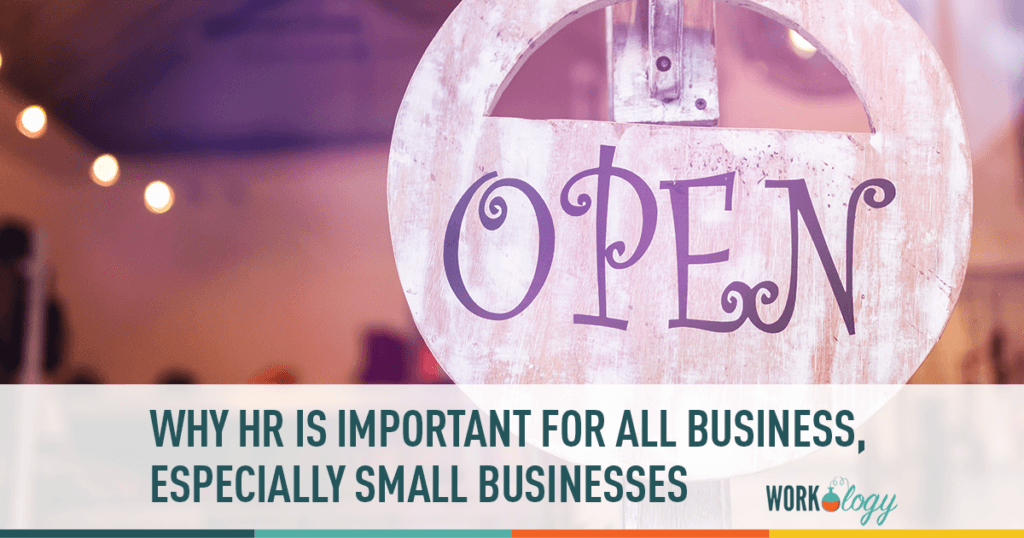While a small business does not necessarily need to employ a dedicated HR professional, it is important to have someone who manages the business’s HR needs. If you have employees, you need to be thinking about human resources. It’s that simple. Regardless of the size of your company, certain employees can be a liability; however, with someone managing your HR needs, this liability can be mitigated.
Why HR Is Important for All Business, Especially Small Businesses
Basic HR Functions
At its most basic level, HR for small businesses encompasses compliance with applicable labor laws, hiring and creating a channel for dealing with employee issues. If your business is growing, it can be good to include strategic planning as well. Benefits also fall under the HR umbrella.
Compliance and dealing with employee issues are probably the two most challenging areas for a small business. There are numerous federal, state and local labor laws that cover both these areas. Laws cover requirements such as how to store employee files, how to administer leaves of absence, when to pay overtime, requirements for classifying exempt and nonexempt employees, how long a meal break must be and more.
An employee handbook is a good tool for compiling your HR policies and practices. It’s not only a good resource for the person handling HR at your business, but it is also an effective way to communicate policies and expectations to your employees.
HR includes understanding all the laws and regulations, so you know how to handle everything from benefits to difficult employee issues. For example, what do you do if an employee comes to you and says they are being harassed by a manager? Or, is it legal to require a server to cover the bill of a customer who left your restaurant without paying?
Hiring requires knowing what can and cannot be asked in an interview as well as how to set up an effective hiring process that finds the right candidates to fill your current openings. Later this month, I will blog about how job descriptions can be a good foundation for a successful hiring process.
Risks of Avoiding HR
Earlier this year, The Wall Street Journal published a piece on companies that have chosen to do away with HR departments. They instead rely on managers to perform HR-related functions within their department, and they encourage employees to work out problems among themselves. Sounds interesting in theory, but it can be risky when there is no centralized person or department who keeps up with the latest changes in employment law and regulations.
Small businesses can be hit especially hard by a wrongful termination lawsuit because they often do not have the financial resources to pay all the costs associated with a lawsuit. Good HR support, whether it be outsourced or covered by someone in-house, can reduce the risk of costly lawsuits.
Options for Covering HR Responsibilities
When a company hits about 50 employees, it may be time to start thinking about having a dedicated HR professional on staff. This number may vary depending on the type of business, growth and how much time managers are spending on HR functions. When a company is experiencing rapid growth or a high rate of employee problems, it may be best to bring on a full time HR person even sooner. Until you reach the point where you have a full time HR professional, there are a couple options for covering this part of running a business.
The easiest approach is to assign HR duties to an office manager or someone else who manages the day-to-day operations of the business. It is important that this person attend regular HR seminars. There are a lot of free webinars and low cost local seminars that cover HR topics. Local seminars are a great way to network with people in HR—people who could be a good resource later on when you have an HR question.
HR consultants can also provide support to small businesses. Many offer on-call services to answer HR questions, compliance checks, employee handbook reviews and training. With some training, an office manager handling HR can take care of most of the day-to-day tasks; however, it is a good practice to be connected with an HR consultant for the times when challenging situations come up. HR consultants can also provide training to your staff on topics like harassment, interviewing, corrective action and more.
Regardless of what approach you take to cover your HR needs, including HR as part of your business strategy will ensure compliance with applicable labor laws. It will also provide a structure for communicating and implementing good workplace practices with employees.









